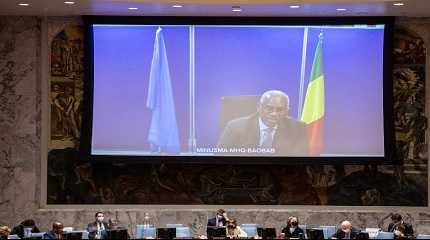
UNITED NATIONS, Jan. 11 (Xinhua) -- A UN envoy said on Tuesday that Mali's partners should help lay the foundations for lasting stability in the worn-torn landlocked country in West Africa.
Mali's partners should build on the aspirations of the Malian people for peace "to help lay the foundations for lasting stability," the special representative of the secretary-general for the country, El-Ghassim Wane, told the Security Council's meeting on the situation in Mali.
A decade after civil conflict erupted in Mali, hopes for an early resolution to insurgency and strife have not materialized, said Wane.
Instead, the UN top envoy explained, "insecurity has expanded, the humanitarian situation has deteriorated, more children are out of school and the country has been affected by an endless cycle of instability."
In fact, more than 1.8 million people are expected to need food assistance in 2022 compared to 1.3 million in 2021, the highest level of food insecurity recorded since 2014.
And more than half a million children have been affected by school closures, which the envoy believes puts "the future of the country in jeopardy."
Despite these challenges, Wane argued that the situation "would have been far worse" without the engagement of the international community, including the deployment of the UN peacekeeping mission, MINUSMA, in 2013.
The Malian government has been seeking to restore stability following a series of setbacks since early 2012, including a failed military coup d'etat, renewed fighting between government forces and Tuareg rebels, and the seizure of its northern territory by radical extremists.
The special representative also briefed the council on the current stand-off between the Economic Community of West African States (ECOWAS) and the Malian transitional leadership, controlled by the military.
Over the weekend, ECOWAS held an extraordinary summit and decided that the proposed timetable for the transition, lasting up to five and a half years, was "totally unacceptable."
Urging Malian authorities to focus on a speedy return to constitutional order, they decided to uphold individual sanctions put in place on Dec. 12 and imposed additional ones.
The new sanctions include the recall of ambassadors from Bamako, capital and largest city of Mali, the closing of land and air borders, suspension of all commercial and financial transactions (with some exemptions), and the suspension of financial assistance, among others.
Mali reciprocated by recalling its ambassadors and closing its borders with ECOWAS member states.
In an address to the nation on Monday evening, however, Malian transition President Colonel Assimi Goita called for unity and calm, stating that Mali remains open to dialogue.
Wane explained that supporting the transition is a key aspect of the MINUSMA mandate, so the mission will try to find a consensual way out to overcome the impasse.
"A protracted impasse will make it much harder to find a consensual way out, while increasing hardship for the population and further weakening state capacity," he argued, warning that such scenario would "have far-reaching consequences for Mali and its neighbors."
The conflict has also had a devastating impact on civilians and the humanitarian situation.
In such difficult circumstances, Wane described the response to the humanitarian appeal as "lukewarm," with only 38 percent of funding received.




